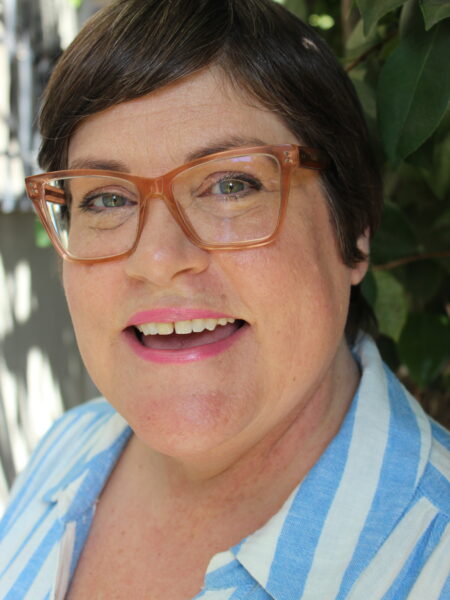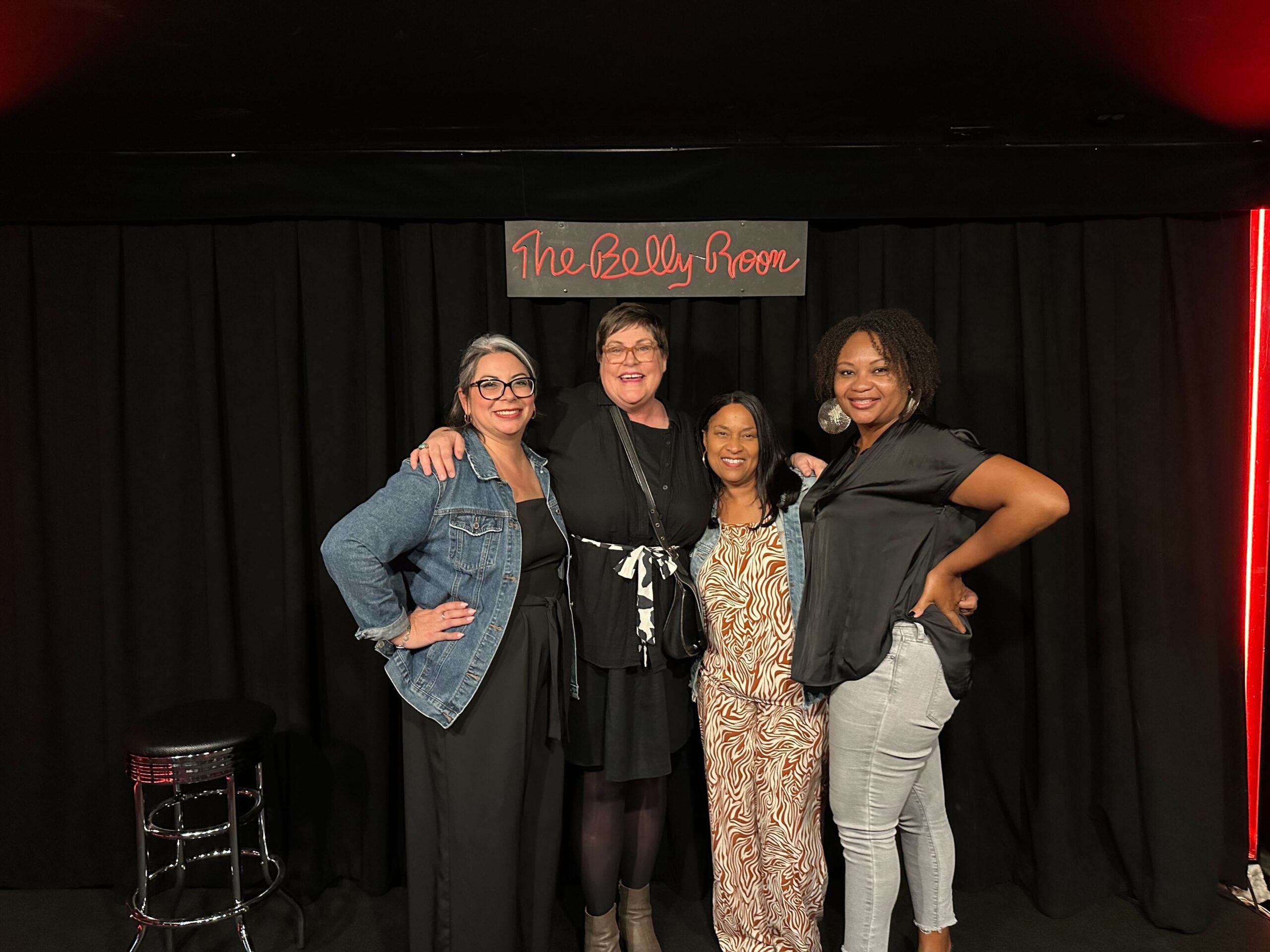
Assistant Professor of Theatre Practice in Comedy Judith Shelton. Photo courtesy of Judith Shelton.
For School of Dramatic Arts faculty member Judith Shelton, stand up comedy is serious business.
“Let’s say you want to miss class because you’re embarrassed, or your sweetheart broke up with you, or your parents are getting a divorce—that’s when you need to be doing stand up,” she explained. “Working, transmuting that pain into something universal and something funny. It helps people. It helps you let go of something that’s dogging you and it helps the audience let go.”
Professor Shelton’s belief that stand up comedy is good for the soul was developed over a long career in the business. She moved to Los Angeles in 1989 to pursue acting and quickly discovered a love for stand up. After spending time with the Groundlings and earning her SAG card by appearing as Cosmo Kramer’s girlfriend on Seinfeld, Professor Shelton became a regular part of L.A.’s comedy scene, performing at all the hottest venues, appearing as a series regular on The Gregory Hines Show and even hosting a relationship advice comedy show every Saturday night on Hollywood Blvd. for more than a decade.
One thing she never imagined herself doing, though, is teaching.
“Stand up comedians, in our bones, we know that you’re not supposed to teach it,” she laughed. “It’s deeply uncool to teach it. But I started teaching it, and I loved it.”
What she discovered teaching is that students from all different backgrounds—not only those aspiring to be serious comics—have found unexpected, sometimes life-changing benefits from her classes. They come to stand up comedy for the laughs, but they stay for the life skills.
“If you can do crowd work and handle heckling, you can do anything,” Professor Shelton explained as one example. “You can do a first date, a job interview, getting angry with someone in line at the grocery store.”
Even beyond teaching practical skills, though, lies a deeper purpose: for this professor, stand up comedy has the power to heal and humanize.
“I think that stand up is spiritual,” she said. “The shortest distance between two people is a laugh.”
A willingness to be vulnerable, a capacity for empathy and even self-acceptance are all things that Professor Shelton’s stand up comedy classes offer as a side benefit to the art of crafting hilarious jokes. In these times, when social media has made “developing a personal brand” into a household concept for most young people, stand up is a place where students can embrace and even celebrate their own difficulties, life challenges and shortcomings.
“I always say that stand up is for the imperfect, and these kids are dealing with a whole lot of perfection,” Professor Shelton said. “On social media, there are lots of perfect people with gorgeous teeth and perfect lives and great spouses and lots of money. But I tell them, in stand up, perfection is not funny. Imperfection is what we’re looking for.”
As a result, stand up comedy helps students express vulnerability, develop empathy and establish confidence.
“I really do see my students fall in love with themselves and each other over the course of the class.”

Something scary, over and over
Another aspect Shelton emphasizes in her courses is the importance of developing resilience. Failure, she explains, is simply part of the form. Experimentation and risk-taking are essential to earning a laugh—and where there is risk-taking, there is bound to be failure.
“It’s part of everything: going to job interviews, flirting with people,” she said. “There’s rejection and failure in everything.”
Of course, there’s also the laughs. Being able to think on your feet, to express even the imperfect parts of yourself and to make people laugh is an invaluable arrow in a young artist’s quiver. Stand up comedy is also a great way for actors and performers to get more involved in the world of performance, to develop their multihyphenate skill set and to have their work more widely known.
“As an actor, it’s hard to get seen. Not everyone will come to your fringe show, not everyone will come to your play. But if you’re so inclined, it’s easy to get people to come to a bar to watch you do stand up,” she explained. “That’s what really helped me the most in my acting career—doing stand up, and being seen all the time, being part of the scene.”
Thanks to faculty like Shelton, the USC School of Dramatic Arts’ stand up comedy program is thriving, and continues to grow in both scope and popularity.
“It’s become a very successful program. I think the reason is that students come from all the other schools to learn stand up. People from engineering, from Annenberg, from computer science,” said Professor Shelton. “A lot of my students say: ‘Hey Jude, I just want to be able to give a good interview.’ I get a lot of people who are socially anxious, people who are deathly afraid of public speaking.”
Whatever the reason for her class’s growing popularity, Professor Shelton is simply grateful for the opportunity to share the magic of stand up with more students. She hopes that they take what they learn in her class and apply it throughout their lives—even if they have no intention of becoming professional comics. “What I think my class is about, honestly, is about doing something scary over and over again, and then looking back and saying, ‘I did something scary over and over again,’” said Professor Shelton. “It’s the best way to build real confidence.”